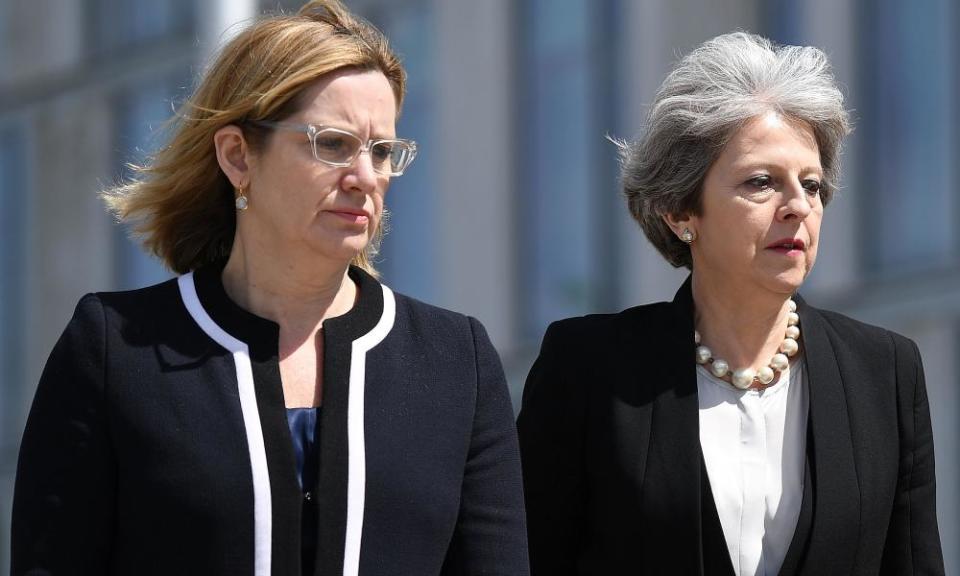Amber Rudd boasted of harsher immigration strategy, leak reveals

Amber Rudd privately boasted to the prime minister that she would give immigration officials greater “teeth” to hunt down and deport thousands more illegal migrants and accelerate the UK’s deportation programme, a leaked private letter has revealed.
In a robust private memo to Theresa May just months before long-settled Windrush migrants were threatened with deportation, Rudd set out her “ambitious” plan to increase removals and focus officials on “arresting, detaining and forcibly removing illegal migrants” while “ruthlessly” prioritising Home Office resources to that programme .
The four-page document, obtained exclusively by the Guardian, reveals Rudd promised the prime minister she would oversee the forced or voluntary departure of 10% more people than May managed when she was home secretary, partly by switching money for crime-fighting to her immigration enforcement programme. Her goal implied she wanted to throw out an extra 4,000 illegal migrants every year.
The letter was sent on 30 January 2017. A few months later Paulette Wilson, a grandmother from Jamaica who had lived in Britain for 50 years, became the first of more than 20 Windrush migrants to tell the Guardian how they were facing deportation or a loss of rights to health, housing and work because of Home Office policy.
The aggressive language and tone of Rudd’s approach to immigration enforcement emerged after the home secretary attempted to blame officials in her own department for the Windrush scandal in which it emerged up to 50,000 mostly Commonwealth migrants were facing possible deportation despite having lived in Britain for decades.
Rudd claimed in parliament on Monday she was “concerned that the Home Office has become too concerned with policy and strategy and sometimes loses sight of the individual”.
That appeared to be an attempt to suggest she had inherited a hardline system from May, who as home secretary announced a policy to create “a really hostile environment for illegal migrants” across government departments.
But in the private memo, Rudd said she believed in the fundamental importance of that hostile environment agenda, which she referred to as the “compliant environment”, an attempted rebranding of the policy by ministers a few months earlier.
The culture that agenda inspired has been widely blamed for members of the Windrush-era generation being threatened in recent months with deportation and denied access to housing, healthcare and jobs.
In 2016, 39,626 people were deported or left the UK voluntarily, according to the UK Migration Observatory, but Rudd’s letter to May indicates a home secretary determined to make her mark and toughen up even further an immigration enforcement regime which uses liveried vans that have become an increasingly common sight in areas with large migrant communities.
She wrote: “Illegal and would-be illegal migrants and the public more widely, need to know that our immigration system has ‘teeth’, and that if people do not comply on their own we will enforce their return, including through arresting and detaining them. That is why I will be refocusing immigration enforcement’s work to concentrate on enforced removals. In particular I will be reallocating £10m (including from low-level crime and intelligence) with the aim of increasing the number of enforced removals by more than 10% over the next few years: something I believe is ambitious, but deliverable.”
Rudd told May her proposals to reduce the overall illegal population had been “informed by the review that you commissioned whilst home secretary”. She concluded: “Everything I have outlined above is aimed not just at radically reshaping and refocusing immigration enforcement but at increasing the public’s confidence in our immigration system.”
Nowhere in the memo does Rudd mention the possible human cost of getting her immigration policy wrong.
Rudd told May that her strategy was “informed by the review that you commissioned as home secretary”. On Thursday, Nick Clegg, who was deputy prime minister from 2010 to 2015, said May’s Home Office had pursued “nasty politics” over immigration.
“They kept resorting to these glib silly unproven headline-grabbing gimmicks and that does create the administrative climate when someone somewhere down the food chain thinks … [for example] we won’t take on good faith what the Windrush generation is saying to us.”
Rudd’s memo was sent as the government stepped up its attempts to bring net migration down into the tens of thousands. The previous year, the figure was 248,000. Four months earlier, May rebooted the government’s immigration taskforce, chairing a committee of 12 cabinet ministers – including the three key Brexit supporters, Liam Fox, Boris Johnson and David Davies – to ensure a new regime was introduced to slash the net number of arrivals into the UK to below 100,000 a year.
Other measures she told May about included obtaining biometric data from countries such as Pakistan, which she said could be “a potential game changer in terms of the numbers we can remove”. She asked for the prime minister’s help to persuade the leaders of other countries to supply such data.
Rudd also said she wanted illegal migrants who were being housed in detention centres before removal to either be sent back to their origin country, released into the community on licence, or tagged to free up beds for the new people that her immigration enforcement team will be picking up.

 Yahoo News
Yahoo News 